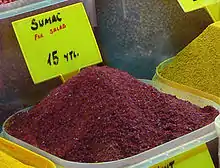sumac
English

the spice sumac
Etymology
Old French sumac, from Medieval Latin sumach, from Arabic سُمَّاق (summāq), from Classical Syriac ܣܘܡܩܐ (summāqāʾ, “red; sumac”).
Pronunciation
- (US) IPA(key): /ˈsuːmæk/
Noun
sumac (usually uncountable, plural sumacs)
- Any of various shrubs or small trees of the genus Rhus and other genera in Anacardiaceae.
- 1957, J. D. Salinger, "Zooey", in, 1961, Franny and Zooey:
- There was a Steinway grand piano […] a cherrywood writing table, and an assortment of floor lamps, table lamps, and "bridge" lamps that sprang up all over the congested inscape like sumac.
- 1957, J. D. Salinger, "Zooey", in, 1961, Franny and Zooey:
- A sour spice popular in the Eastern Mediterranean, made from the berries of tanner's sumac (Rhus coriaria).
Derived terms
terms derived from sumac
- Chinese sumac (Rhus chinensis)
- desert sumac (Rhus microphylla))
- evergreen sumac (Rhus virens)
- fragrant sumac (Rhus aromatica)
- Kearney sumac (Rhus kearneyi)
- laurel sumac (Malosma laurina, formerly Rhus laurina)
- lemonade sumac (Rhus integrifolia)
- littleleaf sumac (Rhus microphylla
- Michaux's sumac (Rhus michauxii)
- Mearn's sumac (Rhus choriophylla)
- Müller's sumac (Rhus muelleri)
- poison sumac (Toxicodendron vernix)
- prairie sumac (Rhus lanceolata)
- Punjab sumac (Rhus punjabensis)
- shining sumac (Rhus copallina)
- skunkbush sumac (Rhus trilobata)
- smooth sumac (Rhus glabra)
- staghorn sumac (Rhus typhina)
- sugar sumac (Rhus ovata)
- tanner's sumac (Rhus coriaria)
- winged sumac (Rhus copallina)
Translations
shrub or small tree
|
|
sour spice
- The translations below need to be checked and inserted above into the appropriate translation tables, removing any numbers. Numbers do not necessarily match those in definitions. See instructions at Wiktionary:Entry layout#Translations.
Further reading



Catalan
Further reading
- “sumac” in Diccionari de la llengua catalana, segona edició, Institut d’Estudis Catalans.
Old French
Noun
sumac m (oblique plural sumas, nominative singular sumas, nominative plural sumac)
- sumac
- 1377, Bernard de Gordon, Fleur de lis de medecine (a.k.a. lilium medicine), page 131-132 of this essay:
- et couvrir par quelconque cause que soit ou par sumac, ou par galles, ou par galbanum, ou par baing d’eaue froide, ou de vive, ou semblables.
-
This article is issued from Wiktionary. The text is licensed under Creative Commons - Attribution - Sharealike. Additional terms may apply for the media files.